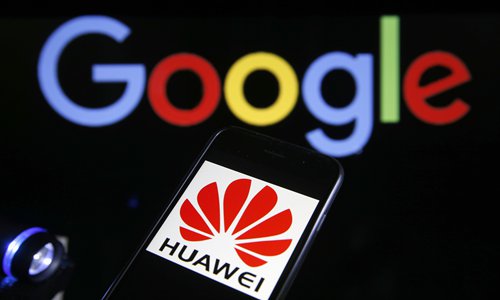China hits back with its own 'entity list’
Foreign firms must rethink China market strategies: analyst

The logos of Huawei and Google on display in Paris, France. Photo: VCG
China will soon release its own entity list targeting foreign entities that seriously undermine legitimate interests of Chinese companies, the Ministry of Commerce (MOFCOM) said Friday.
Chinese analysts consider this move one of the most powerful countermeasures against US suppression of Chinese companies such as Huawei, reflecting China's determination to protect the legitimate rights of its companies in overseas markets.
The announcement was made before previously published retaliatory tariffs on $60 billion in US goods that will take effect on Saturday.
Called the "non-reliable entity list," the list will include foreign entities, individuals and companies that block and shut the supply chain, or take discriminatory measures over non-commercial reasons, and when their actions endanger the business of Chinese companies as well as global consumers and companies, Gao Feng, MOFCOM spokesperson told a press conference.
The detailed measures will be announced in the near future, Gao said.
He said the move comes after some foreign entities violated market rules and the spirit of contracts to block the supply or take other discriminative measures against Chinese companies, which damaged the legitimate rights of Chinese entities and jeopardized China's national security.
Gao said the entity list was based on China's foreign trade law, anti-monopoly law and national security law.
"We're mulling this Entity List approach, which is in line with international rules and regulations," Huo Jianguo, vice chairman of the China Society for World Trade Organization Studies, told the Global Times on Friday.
While the US government can declare a national emergency and crack down on companies like Huawei, and the US Commerce Department also has an Entity List to implement export control, China will set this entity list mechanism to protect our companies, especially those who are treated unfairly in foreign markets, he said.
The US Commerce Department said on May 15 it was adding Huawei and its 70 affiliates to a so-called Entity List, which will ban the Chinese telecom giant from buying parts and components from US companies without US government approval.
Following the order, US tech giant Google restricted Huawei's Android license, a move that could cause serious trouble for Huawei, which is also the world's second largest smartphone vendor, as the Android operating system for mobile devices remains dominant with over 80 percent of the market share.
Also, UK-based chipset maker Arm also cut ties with Huawei, claiming that its designs contained US-originated technology that will be affected by the export controls issued by US authorities.
"In such a complicated environment, our companies are vulnerable to some unfair treatment overseas. As such, we need an emergency plan," Huo said. Those foreign firms which strangle our firms in foreign markets but still earn money in China, are likely to be included into our non-reliable entity list, he noted.
Those foreign firms which strangle our firms in foreign markets but still earn money in China, are likely to be included into our non-reliable entity list, he noted.
Protect legitimate rights
After the trade talks stalled, the trade war between China and the US quickly escalated, which has been extended to high-tech sector, as Washington imposed harsh sanctions on Huawei. In addition, the US government is reportedly considering blacklisting more Chinese tech firms, like video surveillance equipment provider Hikvision and artificial intelligence firm Megvii.
"The Huawei backlash has forced us to fight back," Mei Xinyu, a veteran analyst close to the MOFCOM, told the Global Times.
Foreign companies and individuals on the blacklist will see restrictions in market access to China, including sales, investment, and business licenses. Their personal activities, such as travel to China, will also be rejected, he said.
China has been saying that the country is not afraid of the US pressure on trade, insisting that it will not flinch in the face of US tough talk. All the trade talks should be based on reciprocal and mutually beneficial ways.
US unilateralism and bullying practices are hurting economic relations with other countries, which has inflicted serious harm on itself, analysts and officials said.
Mistake to be corrected
The Huawei ban has caused collateral damage to not only rural Americans who could lose network service but also the entire supply chain in high technology, which has built a close partnership over the years.
Major US tech companies have also voiced their concern over the Washington-proposed restrictions targeting Chinese companies, which could backfire on US firms.
"We have to come up with effective measures to defend a fair business environment, and unpredictable policies hurt global industry growth," Bai Ming, deputy director of the Ministry of Commerce's International Market Research Institute, told the Global Times on Friday.
From now on, foreign companies have to rethink their strategies in the Chinese market, as practices that hurt Chinese companies won't be tolerated, he said.
China is firm in striking back at hegemonic US practices, and fighting a battle always aims to reach a consensus for mutual respect.
"We hope the American people and companies understand this," Mei said
Newspaper headline: China issues own entity list